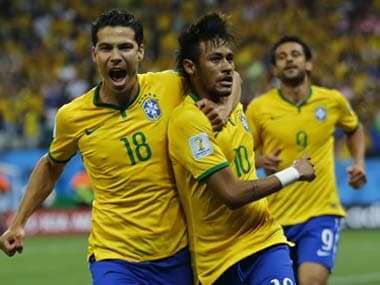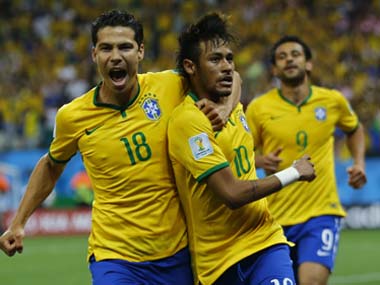Neymar sobbed on the ground as relief poured over him and his team mates when Chile missed their last penalty. Júlio César, dubbed the ‘villain of 2010’ by the Brazilian media, gave an interview while sobbing with relief. Thiago Silva gave a similarly emotional interview, when moments before he sat on his own in quiet prayer. These were the scenes from last Saturday’s round of 16 clash where Brazil just about secured a spot in the 2014 World Cup quarter-finals. After seven years of preparation for the global event, the pressure was finally on and Brazilians want to win, badly. The protests preceding the World Cup tell the world that Brazilians want better: better housing, better education, better salaries, better health. Many of these issues, housing especially, have been heavily affected by the World Cup – they have been affected by football, the thing all Brazilians love. [caption id=“attachment_1602815” align=“alignleft” width=“380”]
 How far can Neymar take Brazil? Reuters[/caption] Yet, the love story of Brazilians and football hasn’t ended because of this. It is still a major vehicle for escapism from a society that is severely broken and obsessively conditioned to love football no matter what. It’s what we’re best at. Despite the fact that football was actually born in England, it is Brazil that is called football country. After all, Brazil has won the Cup five times, more than any other country. The World Cup has always been linked to politics in Brazil. When dictatorial President Emílio Garrastazu Médici was in power in 1970, Brazil was prosperous but violent. The middle class was growing, but hundreds of people were murdered in the military dictatorship run by Médici. He was cruel – but he painted himself as the biggest Brazil football fan of all. Brazil’s 1970 World Cup win provided Médici with the best kind of political propaganda. Nationalism was the norm, and slogans like ‘Brazil, love it or leave it’ and ‘Nobody can hold this country down’ increased the people’s self-esteem and distracted them from the dictatorial reality. Maybe the everlasting obsession with Brazil winning the World Cup is a remnant of those nationalistic adverts. As Brazil grew into a modern country, football was the only light. To many, it still is: boys in the favela often see football as the only way out of a low-income setting. Everyone wants to be Neymar. In 2010 when Júlio César didn’t make the save that would haunt him forever, the people watching the match at the Copacabana Fifa Fan Fest in Rio de Janeiro were inconsolable. The street vendors previously selling green and yellow shirts, bandanas, hats, and flags were abandoning their merchandise on the floor. In about three hours Brazil’s worth went down 100 percent. This year the need to win is even more dramatic, especially because Brazil has never won a World Cup at home. The disastrous 1950 final match against Uruguay in Maracanã resulted in an urgent need for victory. To this day Brazilians are traumatized by the ‘Maracanasso’, a word coined to describe the day – a hybrid of Maracanã and the Brazilian word for failure. All of this pressure has fallen upon one man: Neymar Jr, a kid of only 22 years of age. Nelson Rodrigues, legendary Brazilian writer and journalist, put it well. “In football, like in everything, the star is decisive,” he wrote. “Evidently, the eleven players are indispensable. But what moves the public and sells tickets is the star. I would say that, in Pelé’s team, there’s only him and the rest is landscape.” Neymar carries the pride of an entire nation on his shoulders. Augusto, the Brazil team captain in 1950, was called a ‘traitor of the land’ his whole life after the loss and all of the eleven men who played that day admit they have been haunted by the loss their whole lives. What is in stock for Neymar if he fails to take Brazil to the next level of the championship? Manager of the team Felipe Scolari had the same worry. So much so that he sought psychological counselling for the team after the rollercoaster ride that was the Chile x Brazil match. “I had never done anything of this kind and I think I am enjoying it a lot,” said Neymar, when asked about therapy. “I’m telling you to do [therapy] too, because it’s good for the human being, you become lighter.” Maybe if Neymar gets an early start on therapy, he won’t be haunted by a loss on the field that seems to be looming.
How far can Neymar take Brazil? Reuters[/caption] Yet, the love story of Brazilians and football hasn’t ended because of this. It is still a major vehicle for escapism from a society that is severely broken and obsessively conditioned to love football no matter what. It’s what we’re best at. Despite the fact that football was actually born in England, it is Brazil that is called football country. After all, Brazil has won the Cup five times, more than any other country. The World Cup has always been linked to politics in Brazil. When dictatorial President Emílio Garrastazu Médici was in power in 1970, Brazil was prosperous but violent. The middle class was growing, but hundreds of people were murdered in the military dictatorship run by Médici. He was cruel – but he painted himself as the biggest Brazil football fan of all. Brazil’s 1970 World Cup win provided Médici with the best kind of political propaganda. Nationalism was the norm, and slogans like ‘Brazil, love it or leave it’ and ‘Nobody can hold this country down’ increased the people’s self-esteem and distracted them from the dictatorial reality. Maybe the everlasting obsession with Brazil winning the World Cup is a remnant of those nationalistic adverts. As Brazil grew into a modern country, football was the only light. To many, it still is: boys in the favela often see football as the only way out of a low-income setting. Everyone wants to be Neymar. In 2010 when Júlio César didn’t make the save that would haunt him forever, the people watching the match at the Copacabana Fifa Fan Fest in Rio de Janeiro were inconsolable. The street vendors previously selling green and yellow shirts, bandanas, hats, and flags were abandoning their merchandise on the floor. In about three hours Brazil’s worth went down 100 percent. This year the need to win is even more dramatic, especially because Brazil has never won a World Cup at home. The disastrous 1950 final match against Uruguay in Maracanã resulted in an urgent need for victory. To this day Brazilians are traumatized by the ‘Maracanasso’, a word coined to describe the day – a hybrid of Maracanã and the Brazilian word for failure. All of this pressure has fallen upon one man: Neymar Jr, a kid of only 22 years of age. Nelson Rodrigues, legendary Brazilian writer and journalist, put it well. “In football, like in everything, the star is decisive,” he wrote. “Evidently, the eleven players are indispensable. But what moves the public and sells tickets is the star. I would say that, in Pelé’s team, there’s only him and the rest is landscape.” Neymar carries the pride of an entire nation on his shoulders. Augusto, the Brazil team captain in 1950, was called a ‘traitor of the land’ his whole life after the loss and all of the eleven men who played that day admit they have been haunted by the loss their whole lives. What is in stock for Neymar if he fails to take Brazil to the next level of the championship? Manager of the team Felipe Scolari had the same worry. So much so that he sought psychological counselling for the team after the rollercoaster ride that was the Chile x Brazil match. “I had never done anything of this kind and I think I am enjoying it a lot,” said Neymar, when asked about therapy. “I’m telling you to do [therapy] too, because it’s good for the human being, you become lighter.” Maybe if Neymar gets an early start on therapy, he won’t be haunted by a loss on the field that seems to be looming.
Journalist, blogger and Brazilian. Nicole writes regularly about politics, culture, current events, feminism and pop culture. She is an avid Twitter user and doesn't shy away from speaking her mind.
)